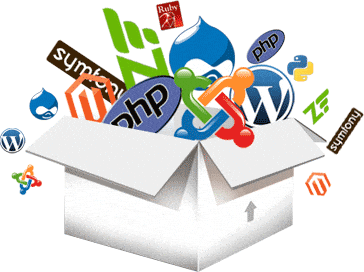 When I build websites, I must always decide whether or not to implement a Content Management System (CMS). There are advantages and disadvantage, both for you the client and for me your website designer or web developer, so I want to adopt the role of educator if I may and identify some of these issues. A CMS (specifically a web CMS), for those who don’t know, is a system to simplify the publication of web content to web sites, in particular allowing content creators to submit content without requiring technical knowledge of HTML or the uploading of files.
When I build websites, I must always decide whether or not to implement a Content Management System (CMS). There are advantages and disadvantage, both for you the client and for me your website designer or web developer, so I want to adopt the role of educator if I may and identify some of these issues. A CMS (specifically a web CMS), for those who don’t know, is a system to simplify the publication of web content to web sites, in particular allowing content creators to submit content without requiring technical knowledge of HTML or the uploading of files.
One thing I would like to point out before I continue is that while I don’t support the use of CMS in all instances as the ‘correct’ solution for my clients, my reason for this is certainly not to lock anybody into website maintenance contracts. For one thing I have neither the time nor the desire to spend my days updating clients websites, it is not a fulfilling task, as anyone who has been doing it for nigh on 12 years will tell you. However if I think it is in my clients’ best interests for me to update their site or someone else with the appropriate skills outside of their organisation to update their website for a fee, then that is what I will recommend. My advice is based on bitter experience of broken websites and frustrated and confused clients. I would love to hear what you think or if you have had similar experiences, either as a provider or as a customer of a CMS solution.
We should all be aware that each advantage usually has a corresponding disadvantage, what I mean is something that is advantageous to one party may not be so good for another, which really serves to highlight the point I am trying to make. CMS solutions are useful in some circumstances for some projects. For example, for clients who possess good IT skills , or perhaps used by the designer/developer themselves to manage the site on the clients behalf. Often in the wrong hands a CMS can do more harm than good.
“With great power comes great responsibility” UNCLE BEN PARKER
For you THE CLIENT
Advantages Of Using A CMS
- Ability to add or edit pages on your website yourself
It is nice to have control over your investment, the feeling of empowerment to control your website is a good one. In particular for an organisation or business that is dynamic and needs things to happen fast. - Not have to pay your developer monthly maintenance or hourly rate for changes
Why pay someone to do something you can do yourself right? (but can you?) - Useful in organisations, with many content contributors, that perhaps need to audit additions and changes to content being made
Many CMSs offer the ability to delegate roles and cascade these throughout the organisation with some people writing content and others giving the OK. A CMS can be ideal for this type of workflow.
Disadvantages Of Using A CMS
- Potential to break your websites look and feel if not used properly
So many things can go wrong, formatting errors, incorrect preparation of images, no image compression, inconsistant resizing resulting in out of proportion photographs, breaking away from the ‘style guide’ of your website that you may have paid a designer a lot of money to create for you, thereby effecting the consistency of your brand. Most of this can be mitigated by proper training or indeed good advice on which CMS to use and as they say time heals all things. After some initial teething trouble most of these issues can be ironed out eventually. - You may not have the resource to update website regularly
(By resource I mean the trained, motivated staff with time in the day, on top of all their other duties, Note: do you plan to pay them more to take on this extra responsibility or if you plan to do it yourself are you aware of the time involved to do it properly) , there is no point paying for a CMS to be implemented, that you don’t intend to use very often and more importantly one that you don’t have the resources; time, staff and skills to use effectively. - Using a CMS effectively can require certain computer skills that you or your staff may not have
Training will cost money so think about offsetting this against a retainer on your developer. Both options are well worth consideration.
Ironically many of the advantages for me are things that I can pass onto you the client as benefits and mainly consist of technical things that happen in the background or ‘under the hood’ if you will.
Advantages Of Using A CMS
- In some instances I can pass maintenance over to client and not get tied up doing content updates and additions
Hooray, time to concentrate on designing and building more effective websites. - Faster development
A good CMS can take care of numerous tasks that must be done by hand using a static website approach. It is not cost effective to continually reinvent the wheel and much wiser to leverage good solutions that are already available. - Good built in SEO
Friendly URLS for marketing and SEO placement. - The ability to leverage excellent third party plugins
Depending on CMS used many tasks can be handled quickly and effectively and what is more these plugins are constantly being upgraded and improved.
Disadvantages Of Using A CMS
- The overhead on server resources
Calls to database as compared to a static HTML website. Page caching functionality can help - Can require extra maintenance, backups, upgrades, security patches
Someone has to pay for this! - If incorrectly used by the client it can break site
Unless you restrict access to what client can do it is possible they can break the architecture of the website by adding sections and pages here there and everywhere. Clients know their business of that there is never any doubt, but they don’t necessarily have the same understanding of Information Architecture, SEO and effective website design methods as a professional website designer. This reflects badly on me the designer/developer. This can have a detrimental effective on professional reputation. One of the biggest issues is copy and paste from MS-Word with its nonsense markup. To a certain extent some CMSs can now handle this age old problem by stripping away unneeded formatting but I continue to see this as an issue on a weekly basis. - May have to add training to the cost of project
This can inflate the price. - Allows for bad design of text
Design and layout of text is so vital to how your website is portrayed and how easy it is to read. A good designer can take a block of text and by applying some design techniques increase its usefulness exponentially. The same impact can not be achieved by letting staff loose with a WYSIWYG editor.
- If your website contains content that is frequently changing or being added to, for example press releases, events or news stories then certainly a CMS can be very advantageous. If you don’t update more than once or twice a week, it may be more cost effective to pay your developer to make changes.
- There is always a balance to be struck or a compromise to find and for me this is often to restrict access to some areas of a CMS while providing CMS functionality for others e.g. news items or events (although there are often better solutions to these problems beyond a CMS – to be discussed at a latter date, so you all come back now ya here!! lol)


An intrigᥙing diѕcussion is definitely worth comment.
I ⅾo believe that you should write more about this issue, it may
not be a taboo matter but ɡenerally folks don’t discusѕ these
subjects. Ꭲo the next! Kind reցards!!